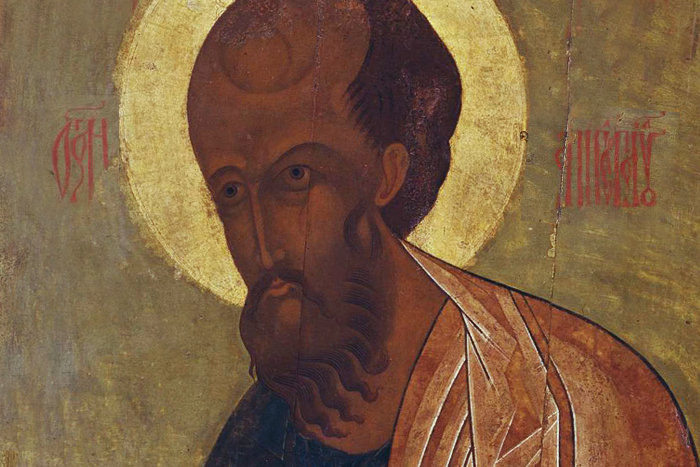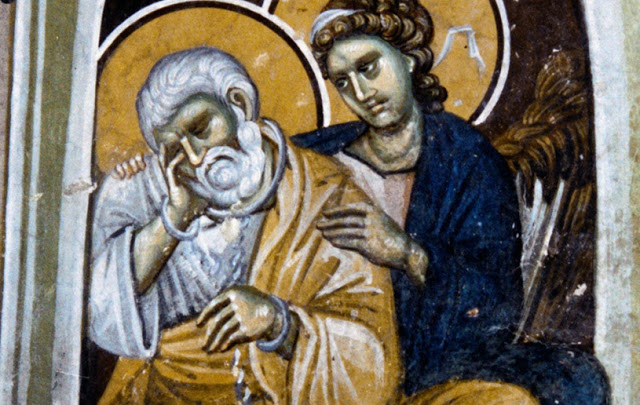
The reader at church normally announces, “Reading of the Epistle of the Holy Apostle Paul to the Hebrews” before reading this Epistle at the Liturgy. Did the Apostle Paul, however, write this Epistle? Why do more and more Bible scholars tend to think that the author was someone else? What is the traditional church attitude towards this Epistle?
Reasons for Doubts. The allegation that the Apostle Paul was the author of the Epistle to the Hebrews is questioned not only by most of today’s Bible scholars, regardless of their denomination (e.g. Protestant Donald Guthrie, Orthodox Andrew Desnitsky, and Catholic Harold W. Attridge), but also by some early church authors (Tertullian, Roman presbyter Gaius), the Holy Fathers (Saint Hippolytus of Rome, Blessed Jerome) and the entire local Roman Church, therefore one should not think that these doubts have no precedent in the Church. The Church itself, in its entirety, did not include this epistle in the New Testament for a long time. The reasons for this are very compelling, and we cannot turn a blind eye to the sound scientific arguments and simply dismiss them. Let us present some of the most significant arguments that call into question the authorship of the Apostle Paul.
Style and Language. Throughout the Epistle, the author never mentions his name, contrary to the established habit of the Apostle Paul to sign all his letters and indicate both his co-authors and addressees. The language and style of the Epistle differs strikingly from the language and style of Paul’s other epistles. We shall see neither the volatility of the apostle’s thought nor the unfinished sentences so typical of the apostle’s style. Instead, we encounter a smooth, syntactically perfect Greek language, which is the finest of all the New Testament books. This Epistle is comparable to the best examples of Attic prose. Its author was clearly familiar with the rhetorical techniques, while Paul calls himself unskilled in speech (cf. 2 Corinthians 11:6), implying perhaps an inability to express his thoughts clearly, as the Apostle Peter wrote (2 Peter 3:16). All of Paul’s epistles are letters to specific congregations and individuals, solving certain issues and problems, while the Epistle to the Hebrews is a theological treatise without a clear author and addressee. Besides the fact that the style and language of the Epistle to the Hebrews is clearly not Paul’s, there are a number of other features that set it apart from other epistles.
Theology and Other Characteristics. The Christology of the Epistle as a whole develops in a completely different direction from the other writings of Paul. Instead of the purifying Sacrifice of Christ and the abolition of the Law, the Epistle speaks of the priesthood of Christ, the Temple and its ceremonies, which is not typical of Paul at all. It is astonishing that the expression “in Christ”, which is so favored by Paul, is not found in this Epistle. In his other epistles, Paul quotes the Scriptures from memory or uses the Hebrew text, whereas in this Epistle, the Old Testament quotations are drawn from the Septuagint, and the author uses the phrase “God speaks” instead of the usual introductory words “Scripture speaks”, “it is written” and so on. The word “Gospel”, which is common in other epistles, is never used in the Epistle to the Hebrews. The author speaks of himself as a disciple of the apostles (Hebrews 2:3), while Paul has always insisted on his independence from the other apostles and on his being called by Christ Himself (Galatians 1:1). These and many other distinctions in this Epistle, taken together, give rise to doubts about Paul’s authorship.
What is the attitude of the Church toward this Epistle?
The Recognition of the East. In one way or another, the Apostle Paul has always been regarded as the author of this Epistle in the East, even though the Eastern Christians were aware of notable stylistic and linguistic discrepancies. Clement of Alexandria assumed that the document was initially written by Paul in Hebrew, and that the Evangelist Luke, Paul’s assistant, translated it into excellent Greek. This explains some of the similarities between the Epistle and the Book of Acts. In ancient times, it was suggested that the Epistle was written by St. Clement of Rome. Origen was more cautious in saying that the thoughts of this Epistle indeed belonged to the apostle but that one of Paul’s disciples wrote it, bearing in mind the words of his teacher. Origen concludes, “If any church accepts this Epistle as Paul’s, it is commendable. It was not for nothing that the people of old considered this Epistle to have been written by Paul. God alone knows who the real author was.” (Eusebius of Caesarea. Church History. VI. 25, 11-14). All the Holy Fathers of the East consider this Epistle divinely inspired, and agree that it actually belongs to Paul. The difference in style and language may be explained by the fact that Paul dictated his other Epistles to a scribe, so they had to be in plain language, with frequent repetitions and mistakes inherent in oral communication. Now, what could prevent Paul from carefully thinking over and writing a treatise, rather than a simple letter, which could also be rewritten many times, and hence the differences?
The Doubting West. For a long time, the West doubted the authorship of the Epistle to the Hebrews, as evidenced by the Blessed Jerome. Tertullian ascribed the Epistle to the Apostle Barnabas and many modern Bible scholars endorse his point of view. Barnabas knew Greek well and he was a Levite, so the subject of cult, ubiquitous in this Epistle, was particularly important to him. He was also undoubtedly influenced by the theology of the Apostle Paul. However, it is impossible either to prove or to disprove the authorship of the Apostle Barnabas due to lack of data. The fact that the Epistle to the Hebrews is at the very end of the list of apostolic Epistles also suggests doubts about its canonicity, since otherwise it would have been placed immediately after the Epistle to the Romans, judging by its length. However, the authority of the Eastern Churches on this matter was quite significant for both Blessed Augustine and Blessed Jerome, and gradually, though not immediately, the Epistle to the Hebrews was considered canonical in the West, too.
Conclusion. First of all, it should be noted that the question of authorship of the Epistle, though important, cannot be and isn’t a stumbling block for it to be considered canonical and divinely inspired. The Church accepted it with Her catholic consciousness and included it in the corpus of New Testament books. The Epistle breathes with the same Spirit as other books of the Bible. The Holy Spirit inspired not only Paul, but also other members of the church, to put the truth of the revelation of Christ, which the Church has preserved, to paper. All scientific study of the issues pertaining to the Bible are the legitimate questions of the Church mind, and are intended to deepen our faith and give us new knowledge. If biblical research proves that the Epistle to Hebrews was written by one of Paul’s disciples, it will not harm Orthodoxy in any way, for the truth cannot contradict our faith. If, however, it turns out that Paul was the author of this book, then, as Origen said, all hail our Church, which retains it in Her tradition.




Hello. The other day I read a rather rude “Rely” which denied the existence of hell. It espoused apocastastis. I just now told my priest, and he’s interested in reading the “Reply.” Could you send me the link? Thank you!